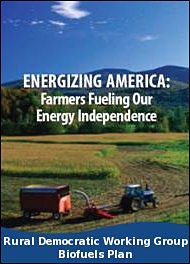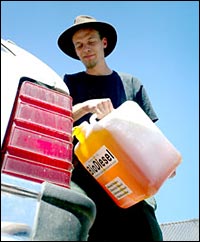Climate Climate & Energy
All Stories
-
A look at the impacts of biofuels production, in the U.S. and the world
Nothing but blue skies from now on? Photo: house.gov Great news! We can finally scratch “driving less” off our list of ways to curb global warming and reduce our dependence on foreign oil! Biofuels will soon not only replace much of our petroleum, but improve soil fertility and save the American farmer as well! Sound […]
-
Find out which cars can run on ethanol and biodiesel
Going bio with your auto doesn’t mean you have to invest in some strange contraption your neighbors will stare at. In fact, upward of 4 million cars currently on the road in the United States are already compatible with E85, a blend of 85 percent ethanol and 15 percent gasoline. More automakers are making new […]
-
All the resources you need to hop on the biofuels bandwagon
Once upon a time, we were going to make a beautiful map for you, showing all the available biofuel pumps in the country. Then we realized: hey, there are already beautiful maps out there. Not to mention books. And articles. And organizations working their tails off on this stuff. So why reinvent the wheel? Instead, […]
-
Umbra on peak oil
Dear Umbra, I have recently been alerted to what many people term “peak oil.” I don’t know how to characterize my feelings regarding this subject. Obsession might be a good term. I feel that I need to prepare. What do you think? Is “peak oil” another Y2K? MichaelPittsburgh, Pa. Dearest Michael, Who cares if it’s […]
-
A lighthearted look at biofuels through time
The way most people talk about biofuels, you’d think they were a brand-new invention. But using natural products for fuel is an idea as old as the hills, as this highly selective timeline demonstrates. Mid-1800s: Soap-makers begin to transesterify vegetable oils — you know, exchanging the alkoxy group of an ester compound by using another […]
-
How the world got addicted to oil, and where biofuels will take us
They may be hyped as the way of the future, but biofuels already count as a juggernaut. Supported by the government and embraced by the Big Three automakers, ethanol is surging in the United States. Biodiesel, meanwhile, is roaring ahead in Europe as the continent strives to meet its carbon-emission obligations under the Kyoto treaty. […]
-
A Grist special series on biofuels
What is ethanol, and how's it different from biodiesel, and where does fry grease come in? Are there cars that can run on biofuels, and who's making them, and where can they fuel up? Who sells it, who makes money off it, and why's it such a political darl
-
It’s a disaster, not a catastrophe
 A Guardian story suggests that we may have as much as eight degrees of global warming already locked in, in the form of stored heat in the ocean. But a substantial stored-heat backlog in the ocean has been well-known for some time. That it is greater than expected is bad news -- but (as I've confirmed in correspondence with Gavin Schmidt of Real Climate) this does not mean that all or most of that stored heat is going to "come back" and fry the planet, provided we take action in time.
A Guardian story suggests that we may have as much as eight degrees of global warming already locked in, in the form of stored heat in the ocean. But a substantial stored-heat backlog in the ocean has been well-known for some time. That it is greater than expected is bad news -- but (as I've confirmed in correspondence with Gavin Schmidt of Real Climate) this does not mean that all or most of that stored heat is going to "come back" and fry the planet, provided we take action in time.I know James Lovelock, the brilliant inventor of the Gaia hypothesis, is spreading the "8 degree" misinterpretation, but most climate scientists do not agree with him.
Climate disruption is a serious crisis for the human race, but the reality is bad enough. No need to make solving it harder by exaggerating the threat. RealClimate has posted a number of articles debunking exaggerated panic-mongering:
-
Get ready for a special series
Been hearing a lot about "biofuels"? Having more and more trouble concealing your ignorance about them? Wish someone would pull together a special series of articles, explaining the differences among various biofuels, analyzing who profits from them, listing the various political initiatives around them, interviewing experts, and answering once and for all the vexed questions about energy balance?
Well aren't you in luck! On Monday morning, steer your browsers to grist.org. All your questions will be answered.
-
New report say so
I meant to write a few days ago about the new report (PDF) from the McKinsey Global Institute which says that ... are you sitting down? ... efficiency is the fastest, cheapest way to cut global energy consumption. As Keanu would say: woah.
Anyway, Joel Makower's got a nice post about it, so go read that.

